Imagine trading the hustle and bustle of city life for Hakuba’s serene, snow-capped mountains. Picture yourself sipping a warm cup of coffee as you gaze out at the quiet snowfall, all while staying productive and connected to your remote job.
Welcome to working remotely from Hakuba – where the majestic beauty of the Japanese Alps meets the flexibility and freedom of remote work.
It’s not just a change of scenery; it’s a transformative experience that enhances your work-life balance and personal life, offering a unique blend of productivity and tranquility. Discover how Hakuba can redefine your remote working experience.
Hakuba White Fox Co offers luxury accommodations with personalized concierge services.
Book your next ski vacation.
What is Remote Work
Remote work, also known as telecommuting, telework, work from home (WFH), and hybrid work, has significantly increased in popularity over recent years. Thanks to advancements in technology, it’s now possible for people to work from virtually anywhere in the world, as long as they have a stable internet connection. This shift has opened up a world of possibilities, allowing individuals to tailor their work environments to better suit their lifestyles. Remote work offers numerous benefits, including increased flexibility, enhanced productivity, and a better work-life balance; working remotely can lead to a more fulfilling and efficient work experience for individuals and organizations.
Benefits of Remote Work
Remote work offers many benefits that can transform personal and professional lives. Here are some of the most significant advantages:
- Increased Flexibility and Autonomy: Remote work allows individuals to set their schedules, providing the freedom to work during their most productive hours.
- Improved Work-Life Balance: By eliminating the daily commute, remote workers can spend more time with family and engage in personal activities, leading to a healthier work-life balance.
- Increased Productivity and Efficiency: Many remote workers find they are more productive when working from home, free from the distractions of a traditional office environment.
- Access to a Global Talent Pool: Organizations can hire the best talent from around the world without being limited by geographical boundaries.
- Reduced Environmental Impact: Remote work contributes to lower carbon emissions by reducing the need for daily commutes, making it a more sustainable option.
Why Work Remotely in Hakuba
Working remotely from Hakuba offers an unparalleled experience that combines the tranquility of the Japanese Alps with the flexibility of remote work. Imagine starting your day with a breathtaking view of snow-capped mountains and sipping your morning coffee in a serene environment that fosters productivity and creativity. Hakuba is a haven for nature enthusiasts and a perfect spot for remote workers seeking a unique blend of work-life balance and personal life enrichment.
Benefits of Working Remotely in Hakuba:
- Scenic Beauty: Surrounded by the Northern Japanese Alps, Hakuba provides a stunning backdrop that inspires and relaxes, enhancing your remote working experience.
- Improved Work-Life Balance: With ample opportunities for outdoor activities like skiing and hiking, you can easily incorporate leisure into your work schedule, promoting a healthier work-life balance.
- Enhanced Creativity and Productivity: The peaceful environment and fresh mountain air contribute to clearer thinking and increased focus, allowing remote workers to be more productive.
- Access to Fresh Local Produce: Enjoy delicious meals made from fresh, locally sourced ingredients, which are healthier and more affordable than city prices.
- Fast and Reliable Internet: Despite its remote location, Hakuba offers fast and reliable internet, ensuring seamless communication and video conferencing for remote jobs.
- Cultural and Recreational Activities: From exploring local culture to engaging in various recreational activities, Hakuba offers a rich experience beyond remote work.
- Ideal for Fully Remote Workers: Hakuba is an ideal location for remote workers seeking location independence and a unique work-life balance.
A Firsthand Experience
Experience the magic of working remotely from Hakuba through the eyes of those who have lived it. Our guest contributors share their personal journey of swapping the urban hustle for the tranquil beauty of the Japanese Alps. Discover how a temporary escape to Hakuba transformed their work-life balance and personal life, offering not just a change of scenery but a rejuvenating adventure. Here’s a firsthand account from a family of five who embraced remote work in Hakuba, finding solace and inspiration amid the stunning landscapes.
As a family, we worked and did online schooling for two months from Hakuba in 2020. It was hands down the best decision we made to handle the craziness.
As Tokyo became stricter during March and rumors of a lockdown filled the air, our family started preparing to handle two working parents, two online-school elementary kids, and one energetic toddler at home for at least a month. OMG! Our priorities were space–both inside the house and outside too–particularly arranging a location where we could have the kids play outside safely. It was still technically ski season, so while Tokyo felt uncomfortable, we decided to head to Hakuba to catch the tail end of ski and snowboarding season.
We initially considered staying in Hakuba for a weekend to get away from the stress of Tokyo, but after White Fox suggested a month’s stay, we quickly decided it was where we would spend our time while Tokyo was shut down.
Our Best Memories
- Working while the snowfalls quietly outside, drinking warm, fresh coffee inside
- Lots of early morning and afternoon time on the slopes
- Simple, wholesome meals everyday–ingredients for cooking are directly from the farmers
- 2 skiing wonderkids
- Many snowmen appeared around our chalet (courtesy of the kids’ burning energy)
- Trips to Toyama, Fukui, Shiga, Itoigawa, and so many places we would have never been otherwise
- Fresh food, water & flowers everyday
For the adults working from Hakuba, it was interesting to see how working from Hakuba increased our creativity and output. First, it is quiet. You sleep deeper at night, hear the birds in the morning, and things become even more peaceful when it snows. There is lots of space inside the White Fox Chalets and outside with fresh air, which truly freshens the lungs and mind. There is a Starbucks at the new Snowpeak building and several other cafes that are great for working in if you want a change of venue.
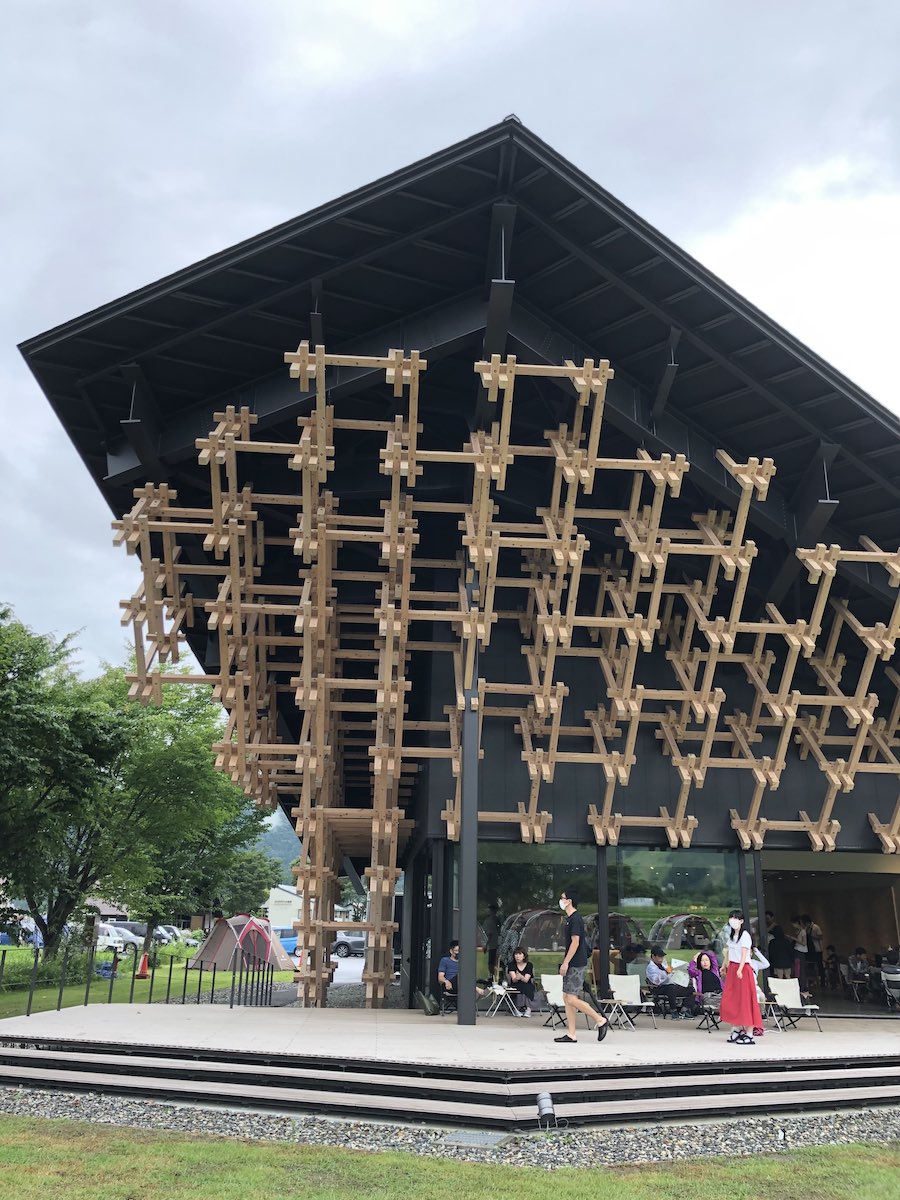
Outdoor Lifestyle
Our daily workouts became morning snowboard runs down Hakuba 47 and Happo or jogging through the village. It was unforgettable being the first ones on the mountain in the morning. The White Fox crew also recommended some professional yoga and gym locations. After those refreshing workouts, we were able to concentrate on work. We did evening walks after dinner, watching the stars come out as it got darker.
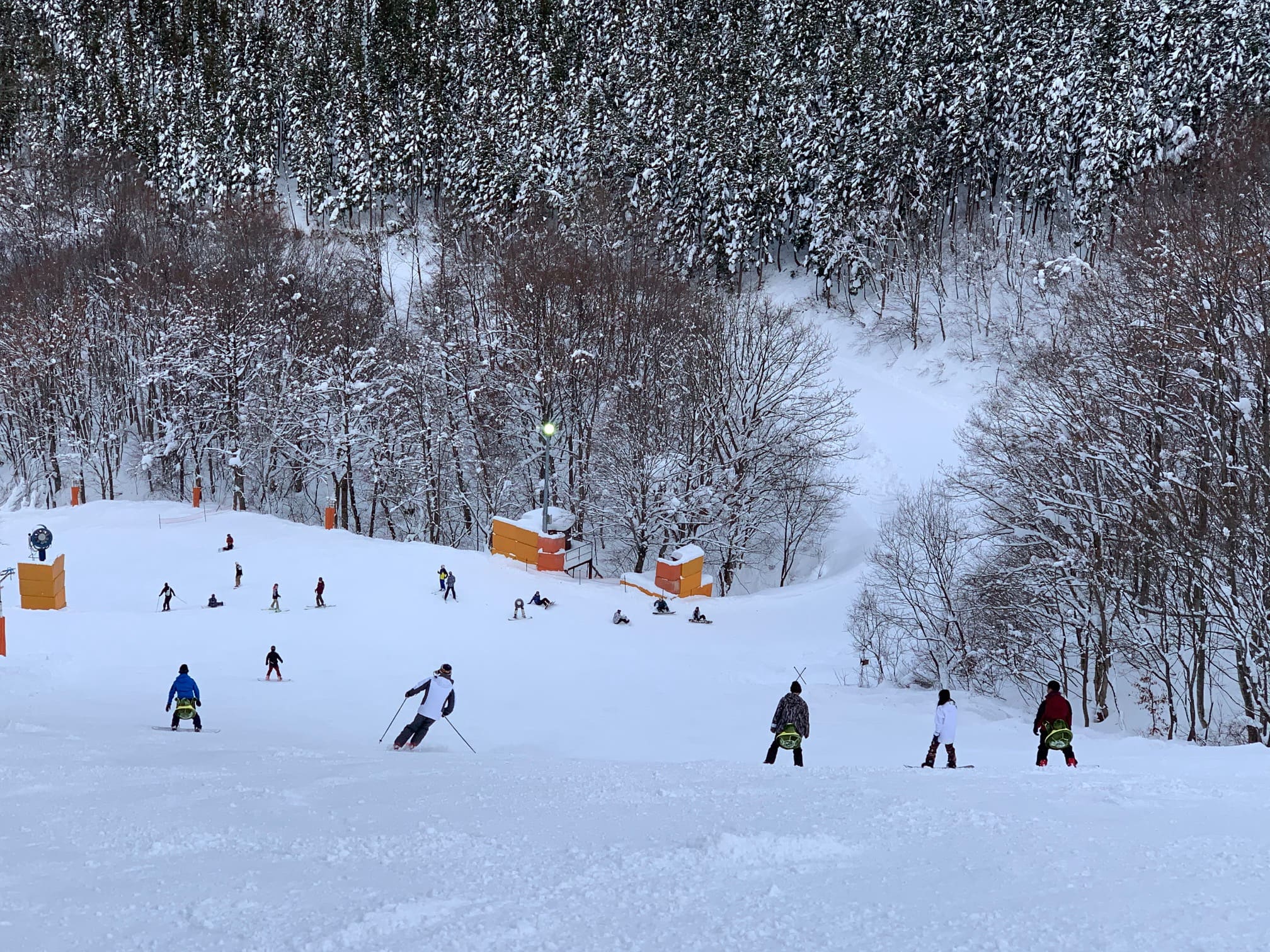
Healthy Living
One of the often-overlooked benefits of remote work is its positive impact on physical and mental health. Remote workers can reclaim valuable time and energy without the need to commute, which can be redirected towards healthier activities such as exercise, meditation, or simply spending more time outdoors. The flexibility of remote work also allows for better management of stress and anxiety, common issues in traditional office settings. By creating a work environment that suits their personal needs, remote workers can achieve a healthier, more balanced lifestyle.
Delicious Food
The food in Hakuba was hands down delicious. As a family, we enjoy cooking, and when the best ingredients are 30-50% cheaper than in Tokyo, it’s a recipe for happy stomachs. Hakuba pork, Shinshu beef, vegetables from the local farmers, and seasonal fruits were great. We switched to drinking tap water over tea, as the Hakuba mountain water was better than anything bottled at the stores. We brought our bread maker and had fresh bread baking during the daytime.
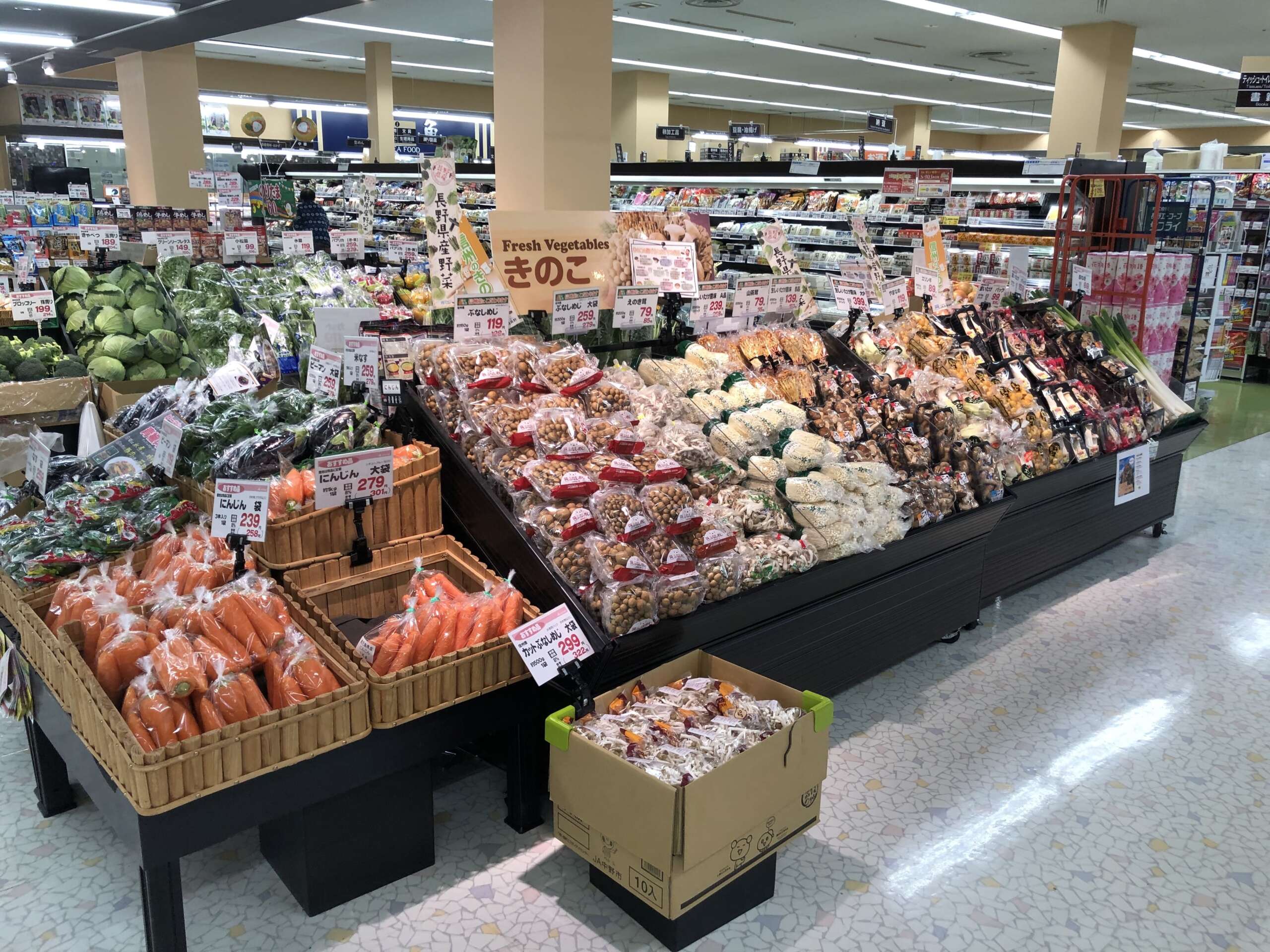
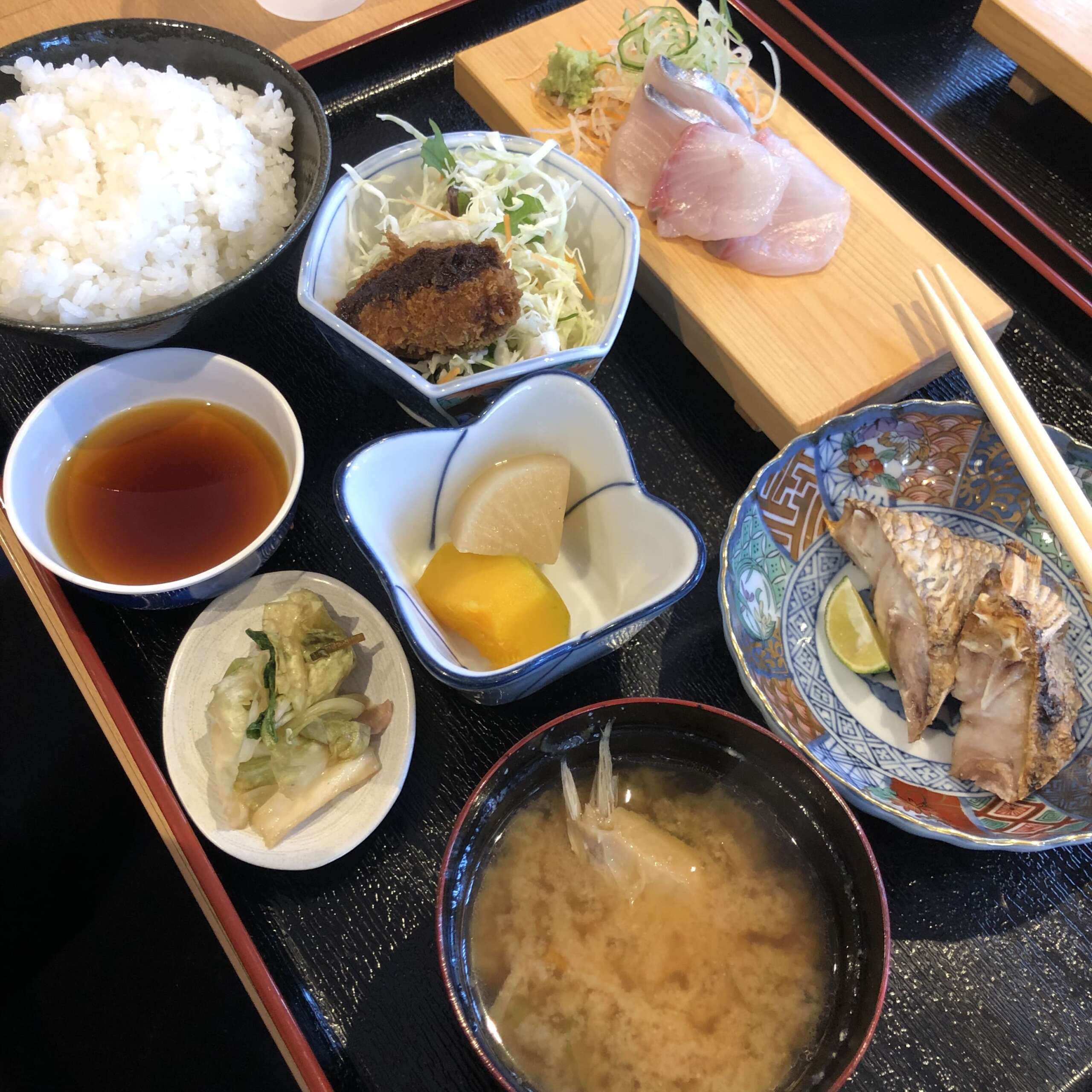
Schooling
Managing online schooling was simple in Hakuba. The Internet was faster than ours in Tokyo, and we had more space for the family to spread out with the dining table, living room tables, and desks in the bedrooms. The flexibility of remote work hours allowed us to balance online schooling and outdoor activities effectively. Our kids would do online learning in the morning, take a break at lunch, and then spend the afternoons outside playing in the snow or skiing. As Spring came, they could experience the blossoming flowers around the valley and the thawing of the village. The huge Green Sports Park was a favorite, as was the indoor Hakubounce trampoline park. Did you know the town is filled with daisies in the Spring?!
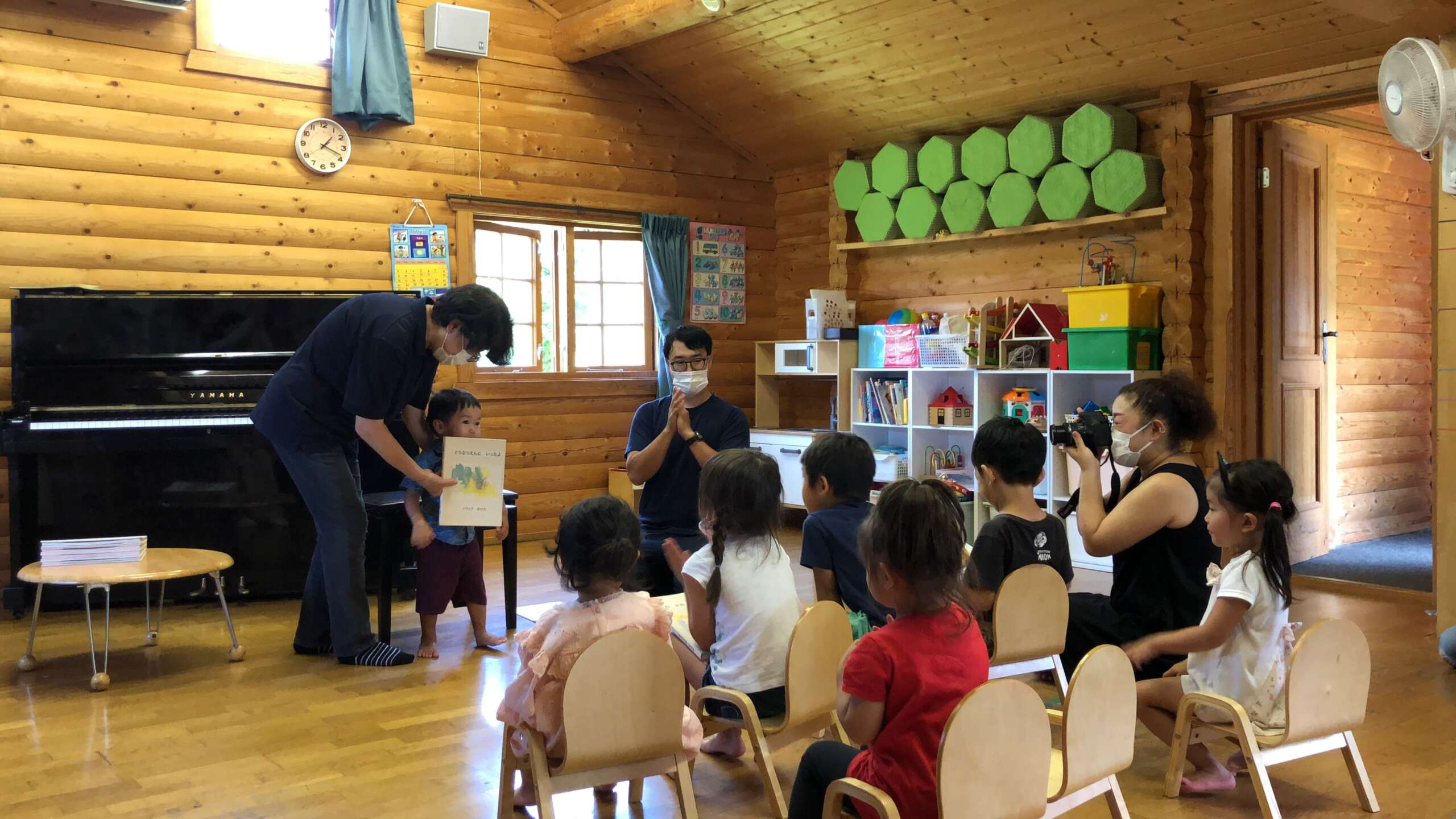
Work-Life Balance
Weekends were full of adventures. Skiing or snowboarding was an option anytime. Since we were based in Hakuba, we also used this to explore Toyama, Matsumoto, and many of the nearby prefectures. A pleasant surprise was the beauty of Kaga and the famous crab of Echizen, Fukui. A dinosaur park in Nagano City was a great day trip for the family. We also visited the Snow Monkeys and Kanazawa’s fish market.
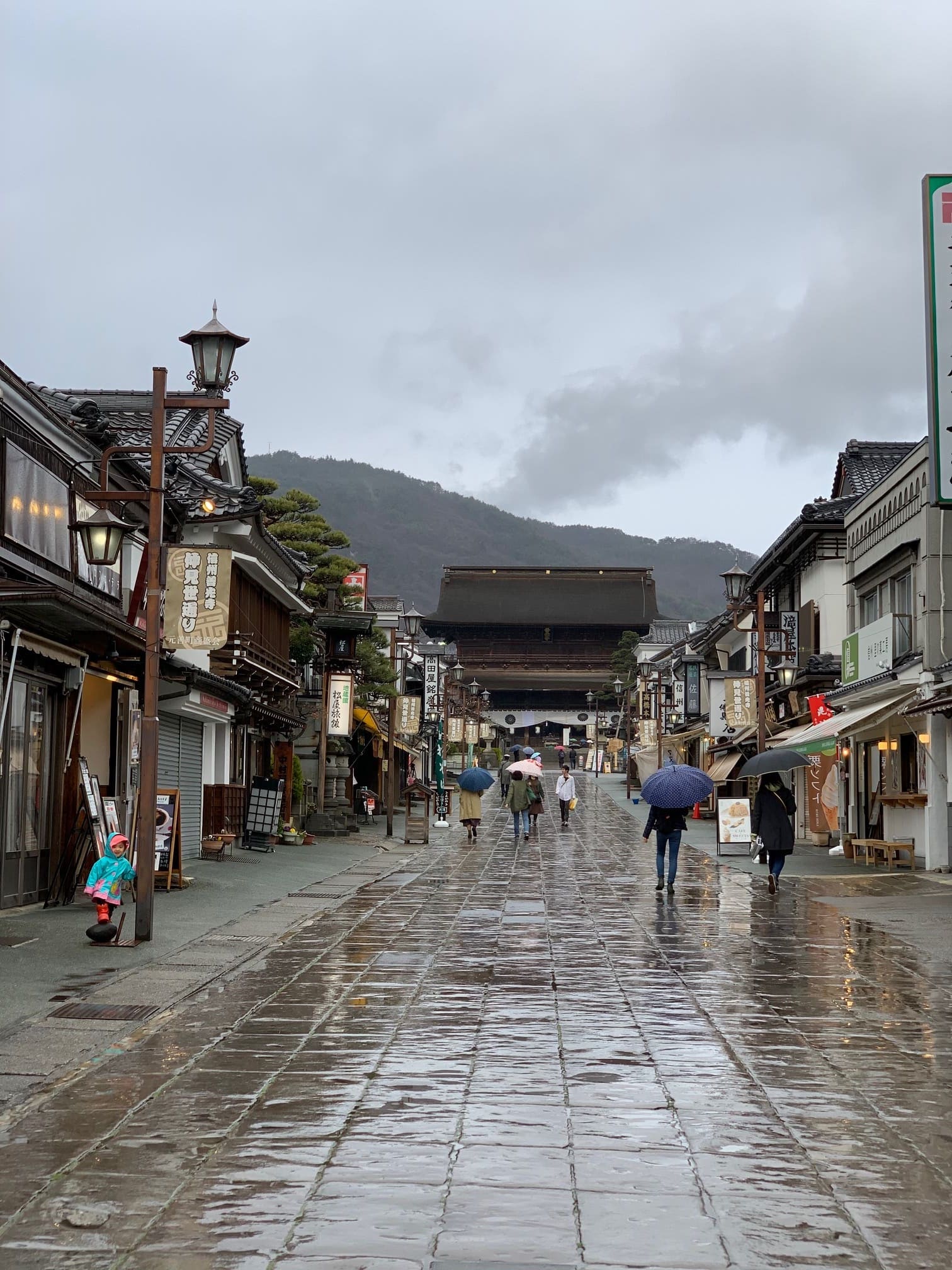
What we Learned
Doing the same thing everyday, living in the same space, leads to the same thoughts. Taking that time to live in the snow country of Hakuba gave us a new perspective and reset priorities. Life after Hakuba significantly improved, allowing us to focus on what is essential and decreasing noise. As a family, we are thankful for the suggestion from White Fox to spend the month, which led to 2 months in Hakuba in 2020. We are happier because of it!
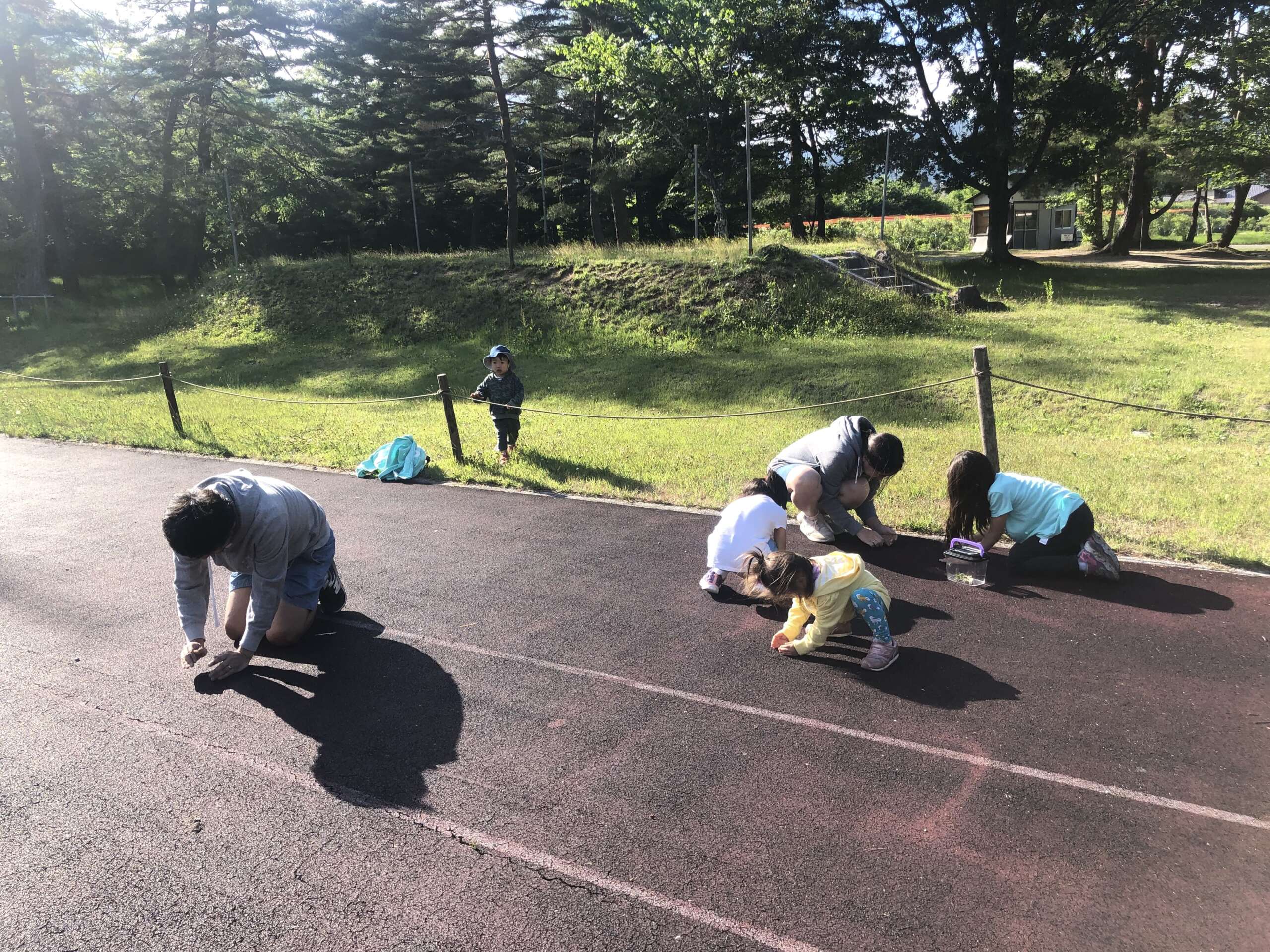
Remote Work in Hakuba
Connectivity and Infrastructure
Hakuba offers a surprising level of connectivity for a mountainous region. With fast and reliable Internet, remote workers can enjoy seamless communication and efficient video conferencing, ensuring that productivity is never compromised. The infrastructure supports various remote work needs, from cozy cafes with Wi-Fi to well-equipped coworking spaces.
Accommodation Options
Remote workers will find various accommodation options in Hakuba, from traditional Japanese inns to modern chalets. Many places offer long-term rental options, providing the comfort and amenities necessary for an extended stay. The White Fox Chalets, for example, are popular among remote workers for their spaciousness and proximity to nature.
Cost of Living
While Hakuba offers an idyllic setting, it’s also more affordable than many urban centers. The cost of living is lower, with fresh local produce available at reasonable prices and accommodation costs that can fit various budgets. The working holiday visa is available to young individuals from most countries, allowing them to experience the affordable cost of living in Hakuba while working remotely. This makes Hakuba an attractive option for remote workers seeking to maximize their savings while enjoying a high quality of life.
Work-Life Balance
The natural beauty of Hakuba promotes an excellent work-life balance. Remote workers can integrate outdoor activities such as skiing, hiking, and exploring the local culture into their daily routines. This balance enhances personal well-being and boosts productivity by providing a refreshing break from work.
Health and Wellness
Hakuba’s environment promotes a healthy lifestyle. The clean mountain air, access to fresh water, and availability of locally sourced food contribute to overall wellness. For those interested in fitness, there are various options, like yoga studios and gyms, to maintain an active lifestyle.
Cultural Experience
Living and working in Hakuba offers a unique cultural experience. Remote workers can immerse themselves in Japanese traditions, from local festivals to culinary delights. White-collar workers have shown a preference for remote work arrangements, which allows them to immerse themselves in the cultural experiences of Hakuba. This cultural enrichment adds value to the remote working experience, making it more than a professional endeavor.
Visa Options for Remote Workers in Japan
Japan, with its unique culture, rich history, and stunning natural beauty, is an attractive destination for remote workers. However, navigating the visa options can be complex. Here are some of the most common visa options for remote workers in Japan:
- Working Holiday Visa: This visa allows individuals from certain countries to work and travel in Japan for up to a year, making it a great option for young remote workers looking to experience Japanese culture.
- Digital Nomad Visa: Japan has recently introduced a Digital Nomad Visa, which came into effect on April 1, 2024.
- Student Visa: For those who wish to study in Japan, this visa allows individuals to work part-time while pursuing their education, offering a balanced approach to work and study.
Tax Implications for Remote Workers
Understanding the tax implications of working remotely is crucial for remote workers in Japan. In Japan, remote workers are subject to income tax, with the tax rate depending on the individual’s income level. Additionally, remote workers may be eligible for various tax deductions, such as those for home office expenses. Remote workers must consult with a tax professional to ensure they meet their tax obligations and take advantage of any available deductions. Proper tax planning can help remote workers manage their finances more effectively and avoid potential issues with tax authorities.
By considering these factors, remote workers can make informed decisions about their work arrangements and enjoy the many benefits of remote work.
Conclusion
In conclusion, Hakuba is not just a destination for vacationers but an ideal spot for remote workers seeking a harmonious blend of productivity, adventure, and cultural immersion. With its robust infrastructure, supportive community, and stunning natural surroundings, Hakuba presents a compelling case for those looking to redefine their remote work experience.
About Us
Hakuba White Fox Co offers luxury accommodations with personalized concierge services.
From ski lessons to dining, our bilingual team ensures a seamless, unforgettable stay in Hakuba.
FAQ
What is the appeal of working remotely from Hakuba?
Working remotely from Hakuba offers a unique combination of stunning natural beauty and the flexibility of remote work. The serene environment of the Northern Japanese Alps provides an inspiring backdrop that enhances productivity and creativity. Additionally, the opportunity to engage in outdoor activities like skiing and hiking promotes a healthier work-life balance, making it an attractive option for remote workers.
How does Hakuba support remote workers’ connectivity needs?
Despite its remote location, Hakuba boasts fast and reliable internet connectivity, ensuring seamless communication and efficient video conferencing for remote workers. The region offers an infrastructure that caters to various remote work needs, including cozy cafes with Wi-Fi and well-equipped coworking spaces.
What accommodation options are available for remote workers in Hakuba?
Remote workers in Hakuba can choose from various accommodation options, from traditional Japanese inns to modern chalets. Many establishments offer long-term rental options, providing the comfort and amenities necessary for an extended stay. Popular choices like the White Fox Chalets offer spacious living areas and proximity to nature.
Is the cost of living in Hakuba affordable for remote workers?
Hakuba offers a more affordable cost of living than many urban centers. Remote workers can enjoy fresh local produce at reasonable prices and accommodation options that suit various budgets. This affordability allows remote workers to maximize their savings while enjoying a high quality of life.
How does the community in Hakuba support remote workers?
The remote work community in Hakuba provides ample opportunities for networking and support. Remote workers can connect with like-minded individuals and residents through meet-ups and collaborative projects. This community atmosphere fosters a sense of belonging and shared experiences, enriching professional and personal lives.
How does Hakuba’s natural environment impact remote workers’ health and wellness?
Hakuba’s clean mountain air, access to fresh water, and availability of locally sourced food contribute to overall wellness for remote workers. The natural environment promotes a healthy lifestyle, with options for fitness activities like yoga and gym sessions enhancing both physical and mental well-being.
How can remote workers immerse themselves in the cultural experience of Hakuba?
Remote workers in Hakuba can immerse themselves in Japanese traditions through local festivals and culinary delights. This cultural enrichment adds value to the remote working experience, making it more than just a professional endeavor and offering a unique opportunity to experience Japanese culture firsthand.
How does remote work in Hakuba help the environment?
By reducing commuter travel, working remotely from Hakuba helps lower carbon footprints and positively impacts climate change.

